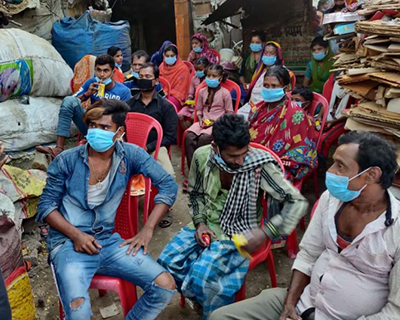
India generates close to 3.46 million tonnes of plastic waste annually and CPCB estimates suggest close to 60% of this waste is recycled. Much of the vibrancy to India’s recycling industry is attributed to the contribution of the informal sector which constitutes self-employed individuals, small and medium scale organizations that are unregulated and many times unlicensed. Taking due notice, the MSW Rules, 2016 mandates recognition of the informal sector to facilitate their integration. Despite this, there is still a lack of a structured roadmap on how cities could accelerate this process of including the informal sector in the formal waste management system.
PWM Rules Amendment
The Government of India introduced the Plastic Waste Management Amendment Rules 2022 in February addressing stakeholder obligations under the EPR regime. This is considered as a positive and a critical step providing teeth to India’s political will to enforce the polluter pays principle. The amendment through a set of measurable steps, targets and timelines holds manufacturers and producers financially and socially accountable for unsustainable plastic use. The amendment, however, misses the opportunity to acknowledge the role of the informal sector and how the EPR mechanism could benefit from their activity. The certification system proposed, links it primarily to the formal collection system recognizing its linkage with registered entities. This formalization of the system establishes the missing link between itself and the informal sector that still remains the pulse of the recycling industry.
Gap Assessment
A study was conducted by Chintan in Agra and Patna under the aegis of the CounterMEASURE II project funded by UNEP, with an aim to identify the gaps in the current knowledge and capacities of key stakeholders on plastic waste management. The study observes that levels of training undergone by the informal sector on plastic waste management remain low with one-third positive responses in Agra and no informal sector respondent reporting any history of training in Patna. The assessment further observes that the mechanism of EPR in these cities may not be strengthened without involving the informal sector and that focus on building their capacities still remains a priority.
Way forward
With the EPR framework evoking positive responses from experts in the country there is a need to fix the link leading to the integration of the informal sector. This may be achieved by mandating the inclusion of the informal sector workforce as a minimum criterion for registration of waste management agencies or PROs. This will present a win-win opportunity for these agencies to gain from the expertise of the informal sector and also in turn provide training to build their capacities on the same. Steps may also be taken to reserve a minimum percentage of staff roles for the informal sector in collection centers and MRFs being set up at the city level. This will not only ensure that rag pickers feature as a part of every waste management team but also would be provided with social identity and a livelihood with a consistent income.
